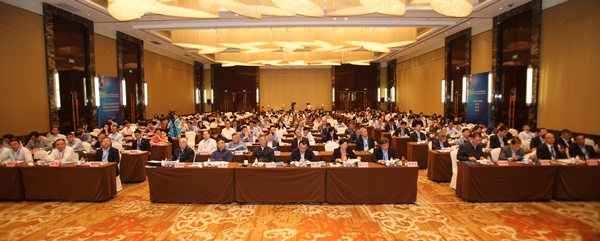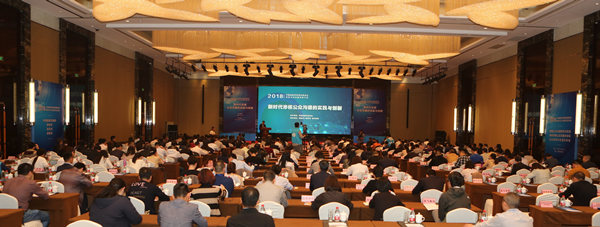Entitled “Practice and Innovation for Nuclear-related Public Communication in the New Era”, China Forum on Nuclear Energy for Sustainable Development - 2018 Conference on Nuclear Public Communication was held on 30 October in Haiyan County. This event was hosted by China Nuclear Energy Association (CNEA), and assisted by Haiyan County People’s Government and Qinshan Nuclear Power Company, with a view to provide advices and suggestions for the public communication in relation to nuclear energy and to facilitate the expansion of nuclear power.

Keynote speeches were delivered by Zhang Xubo, Director of NEA China Nuclear Power Development Center, Niu Changming, Deputy Inspector of SASTIND Nuclear Emergency Department, Feng Youcai, Deputy Director of NNSA/DNFSR Nuclear Safety Coordination Division, and Zhang Tingke, Vice President of CNIA concurrently with Secretary in general. Special reports and thematic reports were presented, respectively, by Du Xiangwan, Academician of Chinese Academy of Engineering (read by Zhang Changming, Director of the Party Group Work Department of CNNC), Wang Naiyan, Academician of Chinese Academy of Engineering, Zu Bing, a member of Director Board of CNNC and Deputy Secretary of Party Committee, Hao Jian, General Manager of CGNPG Nuclear Power Investment and Development Center, Hao Hongsheng, Chief Engineer of SPICL Department of Nuclear Power Safety and Development. Among the meeting were also Gao Song, Vice President of CNEA, a member of the Party Group and Deputy General Manager of National Energy Group, Shao Jianming, Vice President of CNEA and President of Shanghai Electric/Nuclear Power Group, Zhao Chengkun, Executive Vice President of CNEA expert committee, as well as Chen Lingfang, CPC Secretary of Haiyan County Party Committee, and Wu Gang, CPC Secretary and President of Qinshan Nuclear Power Company.
The conference summarized China's good practices and work experience in nuclear-related public communication, and promoted the continued innovation of practices. It also heightened the level and ability of nuclear-related public communication and promoted sustainable development of nuclear power sector domestically in the new era.

Leaders, academicians and experts from national competent authorities, nuclear power sector and research institutions and senior nuclear power colleagues from Hong Kong and Taiwan regions were invited to participate in the two-day meeting for exchange and discussion, encompassing wide ranges of topics such as the new situation, the new task, new requirements, and good practices in public communication. Rational awareness of nuclear safety, development of the behavior guideline, and long-term mechanism for public communication were discussed. In addition, several sessions were included in the meeting concerning nuclear energy public communication, governmental communication to the public related with nuclear, and public dialogue and communication. This provided the dialogue and communication platform for governments, enterprises, universities, media and the public. The authors with distinguished papers on 2018 nuclear-related public communication were granted award certificates.
On the invitation of the conference, the scholars and heads also participated in the meeting and delivered topical lectures, including Xue Ke, Director of Shanghai Jiaotong University Department of Journalism and Communication, Wang Xiaofeng, Director of Nuclear and Radiation Safety Centre Information Institute, Gong Wanlan, Director of People's University Department of Risk Management Research Center, Chen Bucan, President of Taiwan Nuclear Energy Science and Technology Association, and Deng Zhixiang, business supervisor of China Electricity Group (China). The attendees included nearly 300 leaders, experts and representatives from national government departments, local governments, major groups, nuclear power operators, research institutes, universities, media, and community organizations.